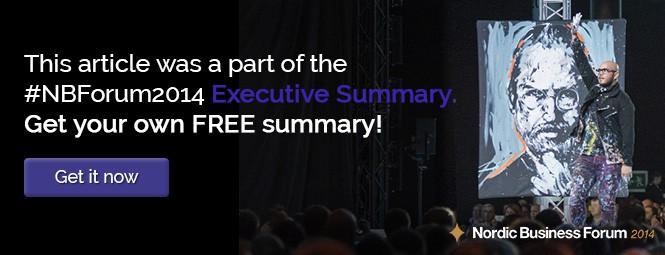30Jan2015
The world is constantly changing thanks to technology. Ten years ago Facebook and iPhones didn’t even exist. How can you stand out? How can your product attract attention and loyalty? Soulaima Gourani urges us to create a purpose for our company that causes consumers to take notice.
“Money can actually destroy the purpose of your company,” says Soulaima Gourani, who works with organizations all over the world. She started out working for companies such as Hewlett-Packard and the A.P. Moller-Maersk Group. She has worked with 1,000 organizations since 2007 as an adviser. Soulaima hears excuse after excuse why they can’t be successful. One of the excuses is lack of money. She advises that focusing on money is not the way to grow in business. Her example is personal. She runs a non-governmental organization (NGO) called Global Dignity in Denmark that doesn’t have money, but is the fastest growing NGO in Denmark.
You can’t pick the winners
Many people think they can pick the winners. “The thing is, it’s impossible.” No, you can’t pick the winners. Sometimes the most unsuccessful people in their youth are the most successful ones. Soulaima certainly would not have been someone people would pick as a winner. Thrown out of the school system in 7th grade, fired three times, she declares, “I’m unemployable.” When she was 15 her dad bet her uncle that she would be a teenage mom. Born in Morocco, she couldn’t get citizenship in Denmark, despite having a Danish mom, until she was four years old. She barely learned to speak English in 2005 and is fluent now, fluent enough to speak out at business forums.
The most successful people in the U.S. right now are the children of immigrants. A Pew Research survey last year found that children of the great wave of immigrants in the 1960s place more importance on hard work and career success than the general public. One famous example is Steve Jobs, the son of a Syrian immigrant. Actress America Ferrera, daughter of Honduran immigrants, is another example.
Soulaima cites three reasons why children of immigrants are more successful:
1. They know what hard work looks like because they see their parents work full time, seven days a week.
2. They put a lot of time and investment into education.
3. They have low self-esteem and want to prove people wrong.
How can a company survive?
When you looked at Fortune 500 companies 15 years ago, you expected one percent to turn 100 and 40 percent to die after 40 years. Today it is drastically different. Companies are only expected to survive up until seven years. What can a company do to survive?
- Think of innovation in a new way. Innovation is not about creating happy people satisfied with their jobs.
- Think multi-generational. By 2020, there will be five generations working side-by-side in the workforce.
- Consider the company’s image. Work with your company’s image or younger people will no longer buy your products.
- Think about how the company can help the environment. Young people are very concerned with the environment and they will put a lot of effort into honoring companies who care about the environment.
Some words are tossed around frequently in business circles. Not every word is a good one to use. Benchmarking is one of them. Soulaima advises against using the word benchmarking. “It means the same shit. You will never become better than the competitors. Stop saying that.” In other words, be different and stand out.
Look at what you have and create hunger.
A study was conducted on apes. They were given an apple and were happy to get it. Then, they were given two apples. They only had the second apple very briefly and it was taken away. They went crazy and destroyed the whole room. “Apes are just like us. They don’t look at what they have but what they’ve lost. That is what we have to change.”
Hunger is something a company needs to create. “We are not hungry enough. You have to create a sense of hunger.” How do you create hunger in a western country where people have never known real hunger? Look at your clients or customers in a different way and start calling them fans. “Can you see how it changes?” Soulaima asks.
Change the way you do business.
People are emotional and lazy. We have many thoughts but not many of them are original. Eighty percent of people’s thoughts are reproduced from yesterday, Soulaima says.
Communicate the purpose of your company and its product to potential customers. Think basic. Ask yourself: How can I create a strong culture of purpose so that people are willing to pay more for my products? Or in Soulaima’s words, “We have to change the way we do business. We have to use the knowledge we have on business behavior and decision making.”
How do you market and sell products today? Fifteen years ago you could go to an agency and buy a campaign. “That is no longer possible. You have to create fans.” Soulaima urges business people to change their expressions. Instead of referring to clients or customers, she recommends calling them fans. Next time you have a client meeting, try saying, “I’m having a fan meeting.” Next time you write an email to an angry customer say, “I’m writing an email to a fan.”
Calling a customer a fan reflects the fact that we are living in a social networking world. Chances are great that your customers have liked your Facebook page. They are fans of your company and your products.
Create a purpose.
People are willing to pay 20 to 30 percent more for a product if they understand its purpose. “It’s called emotional intelligence. Creating an emotional feeling towards your product.” Create strong feelings among your fans. Create a strong culture of purpose so people are willing to pay more for your products.
A good example of products with purpose are the “pink” products whose proceeds benefit the Susan G. Komen Breast Cancer Foundation. Featuring a little pink ribbon on the packaging, the products are easily recognizable in the U.S. as benefitting breast cancer research.
The majority of people surveyed aren’t passionate about their jobs. “You really have to dig deep to find out how you can create these shining eyes among people. It’s all about leadership.” There needs to be a unified feeling of being a part of a community. “This is where leadership gets really important.”
She cautions against being stuck in the same place too long. “If you stay in the same position, in the same company for more than four years, you are 70 percent more likely to not be ready for change.” Not that she is telling people to leave their jobs, but to get access to new knowledge. “It’s all about attitude. It’s all about how you go to work on Monday, and how you look for opportunities.”
Key points:
1. Create a purpose for your company that makes it stand out. The world is constantly changing thanks to technology. Ten years ago Facebook and iPhones didn’t even exist. Figure out how your company can get attention in such a changing landscape.
2. You can’t pick the winners. Many people think they can pick the winners. Sometimes the most unsuccessful people in their youth are the most successful ones.
3. Change the way you do business. Communicate the purpose of your company and its product to potential customers.
Soulaima Gourani is a Danish speaker, author, board member and special adviser to ministers, task forces, government think tanks and demanding private companies. Gourani has received a number of awards for her achievements including Young Global Leader 2012 (World Economic Forum).



